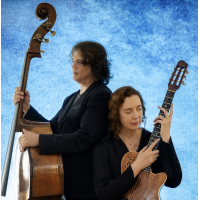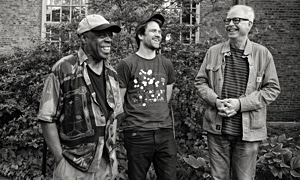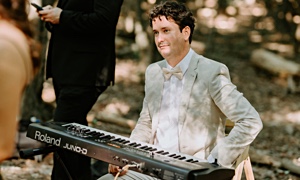Home » Jazz Articles » Six Picks » December 2021
December 2021
 Johannes Luley
Johannes Luley Follow Your Heart
My Sonic Temple
2021
The likes of of Eberhard Weber, Ralph Towner, John Abercrombie and Kenny Wheeler are closely linked, not only musically but most of all because a majority of their recordings was released on ECM Records. They're also quite the musicians to look up to, and West Coast-based guitarist Johannes Luley—otherwise known for his work with progressive rock bands Moth Vellum and Perfect Beings—does so with respect, musical empathy and skill. On Follow Your Heart the guitarist presents nine songs from a number of artists, most of which recorded with ECM from the '70s on—including the above-mentioned ones—and pays homage to a label and musicians who have everything to do with the original music Luley creates today. Weber's "Yellow Fields," originally off of the 1976 album of the same name, even features the typical bass-hybrid sound Weber is known for as Luley engages in a rendition of the track that is both faithful to its original and brings fresh dynamics into the mix. With a support cast of trumpet (Jonas Lindeborg), saxophone (Max Kaplan), drummer Dicki Fliszar and bassist David Hughes as well as the occasional percussive addition from Simon Carroll , Luley navigates through a sonically rich set of jazz blasts from the past that still hold up today—his crystal clear guitar playing being the star throughout. Composers Manfred Schoof, John McLaughlin and Miles Davis / Bill Evans are also part of the programme, with "Yellow Fields," Abercrombie's "Telegram" and Evans' and Davis' "Blue in Green" being only some of the many highlights here. What's most impressive is that Luley is able to weave his own character through each piece and assert his unique voice on guitar, no matter if it's acoustic, electric or effect-drenched—it's always uniquely his.
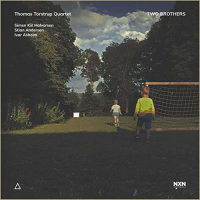 Thomas Torstrup
Thomas Torstrup Two Brothers
NXN Recordings
2021
This confident leader-debut from Norwegian pianist Thomas Torstrup contains a set of tasteful originals, wrapped up in a post-bop guise and offering tight interplay from a youthful quartet. From swinging bars and tight-knit unison passages over brilliant soloistic breaks to Latin grooves, Two Brothers presents a wide range of jazz bound to the tradition but firmly rooted in the present at the same time. Torstrup is accompanied by trumpeter Simen Kiil Halvorson, bassist Stian Andersen and Ivar Asheim on drums for eight exercises in composing that are as assertive as they are appealing—surely also owing to the wonderful production values. But it's the easy-going, not at all worried attitude of the players here that makes the music so enjoyable. Be it the bouncy nature of "Transcribing Raindrobs," the cool drift of "Uphill" or the dry swing in "Modes," the quartet keeps things fresh not by forcing an agenda, but by letting their instruments speak for themselves and drift off into the lines they are naturally prone to. "Learning to Play a Drum" is a good example of the chemistry that exists between the players, as Torstrup and Asheim share twisted exchanges that crescendo into a root-note-based display of improvisation before melody and harmony take over. It should also be mentioned that there's a seriousness to this music, a dynamic arc and compositional thoroughness deserving of attentive ears. This won't be the last we hear from Thomas Torstrup.
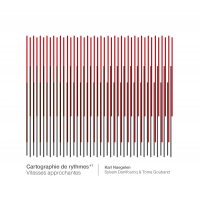 Sylvain Darrifourcq & Toma Gouband
Sylvain Darrifourcq & Toma Gouband Cartographie de rhythmes#1
Umlaut Records
2021
Music on the more experimental and avant-garde side of the spectrum—by design. Two percussionists, Sylvain Darrifourcqu and Toma Gouband connect on Cartographie de rythmes#1—the album's French subtitle Vitesses approchantes meaning "approaching speeds" and being quite the literal translation of the ambient constructions that pervade these musical essays by French composer Karl Naegelen. Polymeter is a defining characteristic protruding in these pieces—it too is taken to its utmost extreme translation by having a click being played back to the two drummers via headphones throughout the session. The result of this unique duo approach to metric simultaneousness is akin to the mid-century Musique Concrète or the designs of pioneering minimalist Steve Reich (the composer's "drumming" comes to mind) by nature, but introduces a rougher, more fundamental dimension to the formula. Beats don't necessarily interlock but run beside each other, sometimes in oblique relation to each other, at other times in harmony. Rarely does a notion of "groove" or "beat" emerge from the drumming, instead dynamics and tones take center stage as the tempi accelerate and slow down again, like ebbing and flowing waves. Hard and frantically hitting waves, that is. It's an intriguing journey, but a more scientific than strictly musical one.
 Matthew Stevens
Matthew Stevens Pittsburgh
Whirlwind Recordings
2021
The solo guitar format has many blueprints in jazz—guitarists like Ralph Towner, Egberto Gismonti, Django Reinhardt, Joe Pass or Bill Frisell are only a fraction of the notable musicians who made an important impact on this specific instrumentation. But it's not necessarily the instrument that dictates the solo recital's design but the musician's approach to this particularly tough challenge. Are the pieces prepared in advance or will the performance be freely improvised? Or should it be a mix of both? And what about the structure of the music, long-form constructions, or minimal, compact pieces, reduced to the core? Keith Jarrett famously has been successful at applying all of the above to his solo music. New York-based guitarist Matthew Stevens however opts for shorter form compositions on his solo-guitar debut Pittsburgh and presents original material which for the most part was worked out beforehand. Even though the music had been prepared, there's a certain roughness to these solo exercises— their schemes resembling sketches rather than completely fleshed-out compositions. Stevens plays on a small body-mahogany acoustic guitar throughout the set, expertly captured here with bite and transparency. Its textural quality underlines the folky chordal work on pieces like "Cocoon" or the ballad "Foreign Ghosts"—melancholy cuts that recall indie-folk acts in the vein of Bon Iver. Other musings are on the more playful side, seeing the guitarist combining closely intertwined counterpoint ("Northern Touch") with brief one-voiced melodic outbursts or going full Johann Sebastian Bach on "Can Am" and parts of "Broke." Some of the music could have done with a little more compositional preparation and focus but on the whole Pittsburgh expertly captures Stevens' unique voice as a guitarist and a composer, the exceptional tonal qualities of his instrument and delivers an intriguing entry to the solo-guitar canon—which is more than anyone could ask for.
 Uxila Exile
Uxila Exile Songs for Harry S. Truman
Eclipse Music
2021
Uxila Exile is Finnish vibraphonist Ilkka Uksila's newly founded outlet for a quite smooth brand of jazz that combs melodic hooks and acid ostinatos with equal vigor. On Songs For Harry S. Truman, the vibraphone virtuoso is joined by long-time associates Joonas Tuuri on bass, Ville Luukkonen on drums and Tomi Nikku on trumpet, as the quartet ventures through a set of original material by the leader going all the way back to 2012. A certain slickness pervades the music's production values and Uksila's supple lines, lending the group's interplay its smooth character, which reaches its peak on ballads like "Navy Blues," "One Grain of Sand" or "Wings." Other cuts don't break the formula—which, as the album takes its course, reveals a tasteful and at times modern take on the post-bop sound of the '60s—they do however see the quartet indulge into heavier pulses, harder exchanges between the players and fiery solos. "Song For Harry" turns into a hard bop workout with whirling trumpet lines dancing around chordal vibraphone patterns and increasingly physical hits and pops on drums. On "Minnesota" the band offers a breezy mid-tempo swing with sparkling vibraphone work recalling the swift style of Gary Burton before "Trace(s)" repeats "Song For Harry"'s trick, creating one big crescendo that revolves around the leader's exceptionally skilled vibraphone leads. Inspired by everything from recent movements against systematic injustices ("Minnesota"'s subtitle reads "of violence" and refers to the killing of George Floyd) to Finnish pop hits ("Wings" uses some of the melodic and harmonic ideas of "Salla tahtoo siivet") and even quotes from the series Twin Peaks ("Song For Harry"), Songs For Harry S. Truman proves an ambitious debut outing that, even if occasionally monotonic, bursts with creativity and deft musicianship.
 Wadada Leo Smith, Jack DeJohnette & Vijay Iyer
Wadada Leo Smith, Jack DeJohnette & Vijay Iyer A Love Sonnet For Billie Holiday
Tum Records
2021
Last but far from least and in quite some contrast to the early musical attempts of the up-and-coming musician talked about previously, here's the mature work of one of the most singular, most experienced, and— one may also note—most prolific trumpeters in the world of improvised music today, crowning his 80th anniversary-year of countless releases with, arguably, the most special one. Combining artists from different incarnations of his Golden Quartet, A Love Sonnet For Billie Holiday, recorded in 2016, finds Wadada Leo Smith reconvening with Jack DeJohnette and Vijay Iyer in unusually-designed trio interplay that's (who'd expect anything else from Smith) way out there. Why not let one of the most respected drummers of the past six decades open the album with an intensively searching four-minute drum solo—drum "orchestration" may be the more suitable term. And why not sample a Malcom X speech at various instances across a Miles Davis-Bitches Brew-era-tinged state-of-the-atmosphere meditation ("Deep Time No. 1"). It's everything that Leo Smith ever and never was, simultaneously and at different times. A racket of timbres, tones and different sounds wash over the speakers as Vijay alternates between electronics, Fender Rhodes, Hammond B-3 and piano, filling in fauvistic soundscapes with neon color as DeJohnette's cymbals crash and splash to soaring trumpet flights. "The A.D. Opera: A Long Vision with imagination, Creativity and Fire, a dance opera (For Anthony Davis)" is a fierce display of the powers at work as the trio navigates through probing and dissonant chamber jazz forms that take explosive turns while the three make their way to a quiet electric haven, resting upon Iyer's purist Fender Rhodes tapestry. It is worth noting that the acoustics are captured in a very dry sound-image on this album, resulting in the occasional shrill fanfare on horn and rather small-sounding toms. At the same time this uncompromising approach to production gives the performances a certain authenticity. Smith's tone is immediately recognizable and inimitable—he needs only to hold one long note (which he does so exemplarily on "Song For World Forgiveness") and all of his experience seems to be wrapped up within it, there for the taking, the studying and the learning. This is soulful music made by soulful musicians through and through.
Tracks and Personnel
Follow Your HeartTracks: Yellow Fields; Brujo; Follow Your Heart; Telegram; One Melody; Blue in Green; Ostinato; Heyoke; Greenstreet.
Personnel: Johannes Lueley: guitars; Jonas Lindeborg: trumpet, flugelhorn; Max kaplan: saxophone, clarinet; Dicki Fliszar: drums; David hughes: upright bass, fretless bass; Simon Carroll: congas, chimes, flexatone.
Two Brothers
Tracks: Transcribed Raindrops; Uphill; First Solar Wind; Modes; Item; Learning to play a drum; Two brothers; Second Solar wind.
Personnel: Thomas Torstrup: piano; Simen Kiil Halvorsen: trumpet, motuh harp; Stian Andersen: bass; Ivar Asheim: drums.
Cartographies et rhtythmes#1
Tracks: Impacts; Vitesses approchantes; Déphasage circulaire; Minimal; Continuum -filtrage.
Personnel: Sylvain Darrifourcq: drums, percussions, objects; Toma Gouband: drums, percussions, lithophones.
Pittsburgh
Tracks: Ambler; Purpose Of A Machine; Buckets; Can Am; Foreign Ghosts; Northern Touch; Cocoon; Ending Is Beginning; Blue Blues; Broke; Miserere.
Personnel: Matthew Stevens: guitar.
Songs For Harry S. Truman
Tracks: Crane Island; Song for Harry; Navy Blues; One Grain of Sand; Minnesota; Trace(s); Land of Scorpions; Wings.
Personnel: Ilkka Uksila: vibraphone; Tomi Nikku: trumpet; Joonas Tuuri: bass; Ville Luukkonen: drums.
A Love Sonnet For Billie Holiday
Tracks: Billie Holiday: A Love Sonnet; Deep Time No. 1; The A.D. Opera: A Long Vision With Imagination, Creativity and Fire, a dance opera (for Anthony Davis); Song for World Forgiveness; Rocket.
Personnel: Wadada Leo Smith: trumpet; Vijay Iyer: piano, Fender Rhodes, Hammond B-2, electronics; Jack DeJohnette: drums, percussion.
Tags
Multiple Reviews
Pat Youngspiel
My Sonic Temple
Eberhard Weber
Ralph Towner
John Abercrombie
Kenny Wheeler
Johannes Luley
Jonas Lindeborg
Max Kaplan
Dicki Fliszar
David Hughes
Simon Carroll
Manfred Schoof
john mclaughlin
Miles Davis
Bill Evans
Challenge Records
Thomas Torstrup
Umlaut Records
Whirlwind Recordings
Egberto Gismonti
Django Reinhardt
Joe Pass
Bill Frisell
Keith Jarret
Matthew Stevens
Eclipse Music
Ilkka Uksila
Gary Burton
TUM Records
Wadada Leo Smith
Jack DeJohnette
Vijay Iyer
PREVIOUS / NEXT
Support All About Jazz
 All About Jazz has been a pillar of jazz since 1995, championing it as an art form and, more importantly, supporting the musicians who make it. Our enduring commitment has made "AAJ" one of the most culturally important websites of its kind, read by hundreds of thousands of fans, musicians and industry figures every month.
All About Jazz has been a pillar of jazz since 1995, championing it as an art form and, more importantly, supporting the musicians who make it. Our enduring commitment has made "AAJ" one of the most culturally important websites of its kind, read by hundreds of thousands of fans, musicians and industry figures every month.






